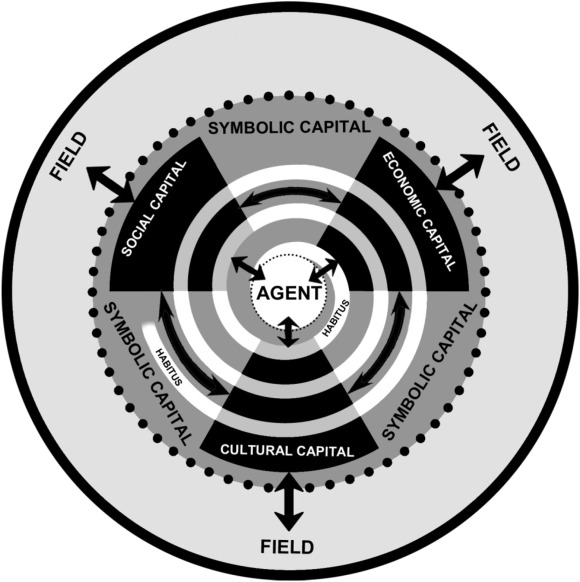
Symbolic Capital and Symbolic Violence: Imposing The Spectre of Legitimacy of The Social Order
“Bourdieu extended the notion of capital, defined as sums of money or assets put to productive use. For Bourdieu, these assets could take many forms which had not received much attention when he began writing. Bourdieu habitually refers to several principal forms of capital: economic, symbolic, cultural and social. Loic Waquant describes their status in Bourdieu’s work in these terms: “Capital comes in 3 principal species: economic, cultural and social. A fourth species, symbolic capital, designates the effects of any form of capital when people do not perceive them as such.”[48]
Bourdieu sees symbolic capital (e.g., prestige, honor, attention) as a crucial source of power.[49] Symbolic capital is any species of capital that is, in Loïc Wacquant’s terms “not perceived as such,” but which is instead perceived through socially inculcated classificatory schemes. When a holder of symbolic capital uses the power this confers against an agent who holds less, and seeks thereby to alter their actions, they exercise symbolic violence.
Symbolic violence is fundamentally the imposition of categories of thought and perception upon dominated social agents who then take the social order to be just. It is the incorporation of unconscious structures that tend to perpetuate the structures of action of the dominant. The dominated then take their position to be “right.” Symbolic violence is in some senses much more powerful than physical violence in that it is embedded in the very modes of action and structures of cognition of individuals, and imposes the spectre of legitimacy of the social order.”
The above passage is pulled from a wikipedia entry on sociologist and philosopher, Pierre Bourdieu, specifically the bit that talks about his concepts of “symbolic capital” and “symbolic violence.” I came across Bourdieu recently while reading some of Hugh Urban’s essays on religious secrecy and wanted to understand Bourdieu’s concepts better. From what little I’ve learned so far I’m really fascinated with Bourdieu’s work; in particular, I appreciate very much that he was mainly “concerned with the dynamics of power in society, and especially the diverse and subtle ways in which power is transferred and social order maintained.” Additionally, I also find it interesting that he was in “conscious opposition to the idealist tradition of much of Western philosophy.” I suppose I just like theorists/thinkers who have some degree of self awareness, admit they’re coming from a particular perspective (i.e. not working in a vacuum), and just “claim their set” or put their cards on the table so to speak 
…
Diagram above by Dr. Shane Conway

To whom it may concern,
I would appreciate if you could reference my diagram please. It is plagiarised in its current form on your website.
Original can be found here: https://www.sciencedirect.com/science/article/pii/S0743016716300158
Regards,
Dr Shane Conway,
University of Galway, Ireland
Done. Thank you for the heads up!